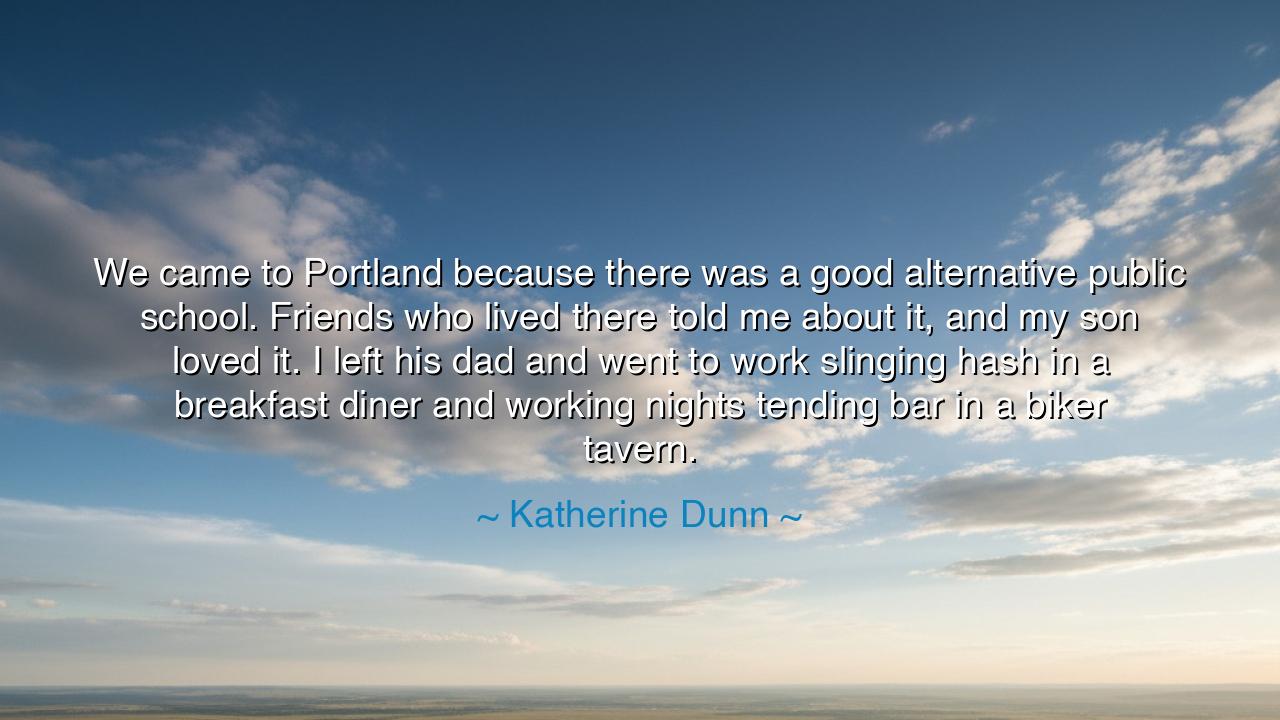
We came to Portland because there was a good alternative public
We came to Portland because there was a good alternative public school. Friends who lived there told me about it, and my son loved it. I left his dad and went to work slinging hash in a breakfast diner and working nights tending bar in a biker tavern.






In the words of Katherine Dunn, “We came to Portland because there was a good alternative public school. Friends who lived there told me about it, and my son loved it. I left his dad and went to work slinging hash in a breakfast diner and working nights tending bar in a biker tavern.” These words, humble and unadorned, carry the weight of quiet heroism. They speak not of fame or triumph, but of the fierce and unyielding love of a mother, the courage of sacrifice, and the strength that arises when one chooses survival over despair. In this brief remembrance, Dunn unveils the valor of the ordinary — a truth that the ancients knew well: that greatness is not only in the deeds of kings or warriors, but in the steadfast hearts of those who labor for love.
The origin of this quote is drawn from Dunn’s own life, long before she became the acclaimed author of Geek Love. Before her art found recognition, she lived through hardship and struggle, raising her son alone, often working multiple jobs to provide him with the chance at a better life. Her journey to Portland, as she recalls, was not a quest for glory but for education, for the promise of opportunity that would lift her child toward a brighter future. In her words, we see the essence of parental devotion — that ancient, sacred instinct to endure any hardship so that another might thrive. It is the same fire that once drove mothers through deserts, sailors through storms, and farmers through famine.
When Dunn writes of “slinging hash in a breakfast diner” and “tending bar in a biker tavern,” she transforms toil into testimony. There is dignity in her labor, and within it a kind of rebellion against despair. These are not the words of complaint, but of remembrance — the way one recalls a battle fought long ago, where survival itself was victory. The ancients would have seen in her the spirit of the hearth-keepers and shieldmaidens, the quiet warriors who fight not with sword or fire, but with endurance, love, and faith in the small hours of the night. She worked with her hands so that her son might work with his mind — and that is a form of greatness no less noble than any sung by poets.
Her story calls to mind that of Antigone, who defied kings and death itself for the sake of love and loyalty. Antigone’s strength was born not from privilege but from conviction — as was Dunn’s. Both women stood in the shadow of hardship and chose to act according to their own moral compass, not the world’s. Dunn’s act of leaving her son’s father and beginning again was not a gesture of defiance for its own sake, but a declaration that love cannot grow in the soil of compromise. Like Antigone, she understood that duty to the heart outweighs the judgment of others.
There is, too, a deep lesson about transformation in this quote. For the same woman who once served coffee and tended bar in the long nights of Portland would later craft stories that burned with insight and strangeness, stories that shook the world’s idea of what beauty and love could be. The hardships she endured became her furnace, forging her art. Every plate she carried, every long shift she survived, fed the voice that would one day write of outsiders and dreamers, of those who labor unseen yet shine within. Her life, like her prose, was fierce, tender, and unflinchingly honest — proof that the soul’s alchemy transforms suffering into vision.
Yet her words are not merely about endurance — they are about choice. Dunn chose motion over stagnation, work over dependence, purpose over comfort. The ancients taught that fortune favors those who move, even when the path is uncertain. She reminds us that the road to redemption often begins with a single, terrifying step — leaving behind what is known, and walking into the unknown for the sake of something greater. For her, that “something” was her son, his joy, and his future. In this, she embodies the truth that love is not a feeling but an action, one measured by sacrifice and persistence.
Let this, then, be the lesson: that every life, no matter how ordinary it may seem, holds within it the potential for nobility. Work done in love, no matter how humble, sanctifies the hands that perform it. Do not despise the small labors, the weary nights, the humble beginnings — for they may be the soil from which greatness grows. If ever you find yourself standing before hardship, remember Katherine Dunn, and take heart. The path of endurance may seem unremarkable, but it is the truest path to meaning.
So, my children of the present age, when you toil, toil with purpose. When you love, love fiercely. And when life demands sacrifice, give it not in bitterness but in faith — faith that from your labor will arise something lasting and beautiful. For even in the clatter of dishes and the din of a tavern, the spirit of greatness may be at work, shaping the future in silence. As Dunn’s life shows, the gods of endurance favor not the mighty, but the steadfast — those who carry their burdens with love, and transform their trials into art.






AAdministratorAdministrator
Welcome, honored guests. Please leave a comment, we will respond soon